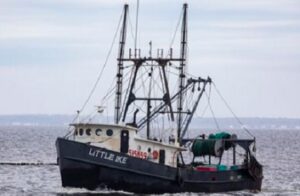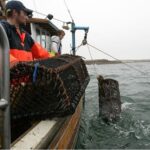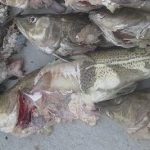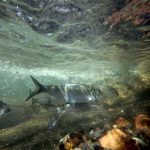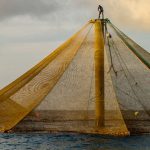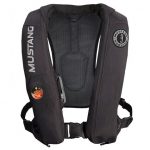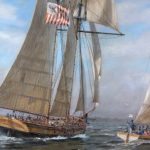Tag Archives: Federal regulations

New England scallopers face a tough 2025
New England scallopers are looking at another tough year in 2025, as they prepare for a set of federal regulations to protect both their livelihoods and the Atlantic Ocean’s scallop populations. If approved by NOAA Fisheries, the new rules, called Scallop Framework 39, will reduce the number of times that full-time vessels can go drag in some federally-managed scalloping grounds — called “access areas” — in the 2025 fishing year. But they will allow these vessels more time to scallop in the open ocean. The start of the access-area scalloping season will also be pushed back from April 1 to May 15, 2025. It will end on March 31, 2026. Local scallopers and industry representatives say the contents of Framework 39 are not a surprise. Landings have been shrinking over the past four years. “We’re just tightening the belt, and taking a deep breath, and riding the storm out,” said New Bedford scallop vessel manager and owner Tony Alvernaz. more, >>CLICK TO READ<< 17:50
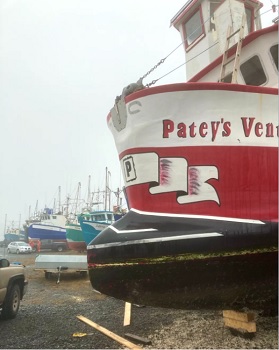
Eastern Canada: Engineers say ditching length limits would mean safer, ‘greener’ fishing boats
Engineers Canada, a national organization that represents professional engineers and engineering associations in each province has declared federal regulations of fishing vessel design an issue of importance. The Fisheries and Oceans rules that were built on the logic of limiting catch capacity have had “unintended consequences”, Vessel proportions have become extreme, with some boats more than half as wide as they are long. McDonald said if Canada is sincere about the goal of fighting climate change and is interested in enabling the fishing industry to adopt fuel-reduction strategies, the vessel length rule needs to be changed. Then there’s the safety issue. photos, >click to read< 14:51
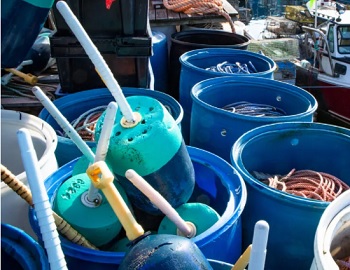
Supply chain issues? Maine lobstermen can’t find gear to comply with new federal regulations
David Tarr, a Brooklin lobsterman, has called around to supply stores and they’re not sure when the gear is supposed to come in, possibly in a couple months. “We can’t get the things that will meet their criteria,” he said. The Maine Department of Marine Resources has received numerous reports that there isn’t a sufficient supply of approved ropes or weak links, a spokesperson said. The department plans to share the reports with federal regulators so they’re aware of the potential challenges with fishery-wide compliance. >click to read< 07:55
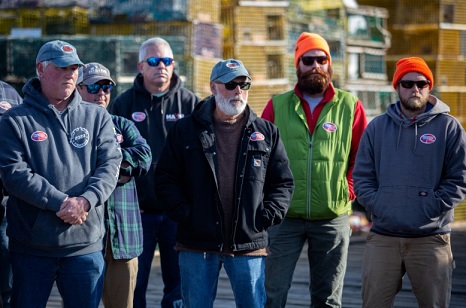
Maine lobstermen appeal to the public to fund legal fight against federal regulations
Without the financial means to fight both the government and environmental activists, lobstermen said their very existence is at stake. Lobstermen speaking at the press conference (today) said they feared the offshore regulations currently proposed would creep inshore, where most of them fish, eventually choking off their livelihoods. They also stressed how much money their industry brings into the state and how it supports communities beyond fishermen. According to the Maine Department of Marine Resources, Maine’s 2020 lobster catch was worth $406 million. That was down from $491 million in 2019. “That’s why we need everyone to step up and help us save the fishery,” photos, >click to read< 17:59
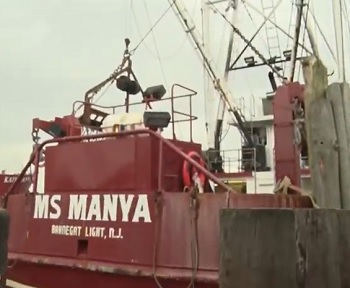
How sustainability efforts are helping the state’s fishing industry
Pete Dolan is the captain of the Ms. Manya, a commercial scallop boat. He’s ready to set sail on a week-long trip — and ideally, when he and his crew return, they will have caught a hefty 18,000 pounds of scallops. Business is booming in the state’s fishing industry, and Dolan claims federal regulations are to thank. Before those regulations were put in place in the mid-1990s, Dolan and his crew would have to spend more time on trips because anyone could go out and catch scallops, which meant supplies were low. But, sustainability efforts from NOAA, Video, >click to read< 18:01
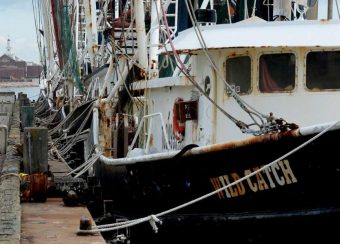
Southeast Texas shrimpers struggle with slow season
Shrimp boats along the Southeast Texas coastline remain docked as their owners try to navigate an industry whose hardships haven’t stopped since Tropical Storm Harvey entered the Gulf of Mexico a little more than a year ago. With federal regulations curbing production and unfavorable sea conditions hampering shrimp populations, Port Arthur and Sabine Pass shrimpers are hoping for the best after a season of loss. Peak shrimping season, from mid-July to October, is closing out this year with about 20 to 25 percent less production than last year, Texas Shrimp Association executive director Andrea Hance said. >click to read<18:38
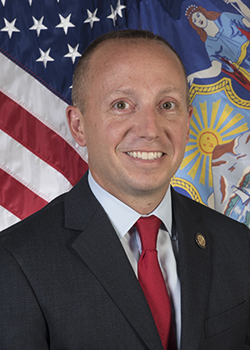
DEC Commissioner Basil Seggos says NY commercial fishermen ‘getting a raw deal’
New York commercial fishermen are “getting a raw deal” in federal fisheries quotas, and the state will follow through on a lawsuit early next year if meetings in December don’t fix the problem, the state’s top fisheries official said last week. At a meeting at the East Hampton Public Library on Thursday, Basil Seggos, commissioner of the state Department of Environmental Conservation, listened to two full hours of complaints about state and federal regulations and management of fisheries, including restrictive quotas, inaccurate fish-population data, difficulty in getting and transferring permits, and “Gestapo”-like tactics of federal observers on local fishing vessels. click here to read the story 10:10
Fish, Lesser Prairie Chickens, and “sue and settle” practices – Federal regulations should be based on reality, not agendas
 OKLAHOMA Attorney General Scott Pruitt has filed a lawsuit challenging the U.S. Department of the Interior and the U.S. Fish and Wildlife Service’s “sue and settle” practices, which dramatically expand federal regulations without public input. Read more here 18:43
OKLAHOMA Attorney General Scott Pruitt has filed a lawsuit challenging the U.S. Department of the Interior and the U.S. Fish and Wildlife Service’s “sue and settle” practices, which dramatically expand federal regulations without public input. Read more here 18:43
Fishermen in Moss Landing being slapped with too many regulations – 27 percent decline of black cod fish since 2006, regulators say
 Because of all the federal regulations over the last several years on the fish, many of the vessels at the Moss Landing Harbor aren’t even untied. “The price went down to where it’s not worth it,” said fisherman John Amaral. “We get less for the big fish now than we used to get for the small, so it cuts the overall price in half.” Read more@kion 06:35
Because of all the federal regulations over the last several years on the fish, many of the vessels at the Moss Landing Harbor aren’t even untied. “The price went down to where it’s not worth it,” said fisherman John Amaral. “We get less for the big fish now than we used to get for the small, so it cuts the overall price in half.” Read more@kion 06:35
RI Fishing Industry Faces Extinction under Federal Regulations
 It’s hard to image an Ocean State without a commercial fishing industry, but one local business owner warns it could happen. Increasingly restrictive federal regulations have cut the commercial fishing fleet in half over the last four years and are imperiling its future, according to Richard Fuka, the president of the Rhode Island Fishermen’s Alliance. “We’re at a dangerous low level,” Fuka said. If the fleet is diminished any further, Rhode Islanders could see a local heritage industry “slip away” and become “a museum piece,” Fuka says. Further tightening federal regulations he says could be just thing that pushes the industry over the edge, according to Fuka. (See below slides for data on the decline.) Fuka said things took a decided turn for the worse after President Obama took office and his new appointee for the National Oceanic and Atmospheric Agenda has pursued a more aggressive regulatory agenda. But he says the industry was already chafing under regulations passed in the later years of the Bush administration. [email protected] 09:26
It’s hard to image an Ocean State without a commercial fishing industry, but one local business owner warns it could happen. Increasingly restrictive federal regulations have cut the commercial fishing fleet in half over the last four years and are imperiling its future, according to Richard Fuka, the president of the Rhode Island Fishermen’s Alliance. “We’re at a dangerous low level,” Fuka said. If the fleet is diminished any further, Rhode Islanders could see a local heritage industry “slip away” and become “a museum piece,” Fuka says. Further tightening federal regulations he says could be just thing that pushes the industry over the edge, according to Fuka. (See below slides for data on the decline.) Fuka said things took a decided turn for the worse after President Obama took office and his new appointee for the National Oceanic and Atmospheric Agenda has pursued a more aggressive regulatory agenda. But he says the industry was already chafing under regulations passed in the later years of the Bush administration. [email protected] 09:26
Navigating the maze of rules
Take bluefin tuna, for instance. Recreational anglers are allowed one bluefin per boat between 27 and 73 inches. However, recreational anglers fishing on a charter boat can land two, but one must be between 27 and 47 inches and the other must fall between 47 and 73 inches. continued@delmarvanow


































